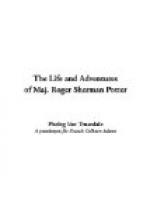“The fashionable critic belongs to the Press Club, from which it may be inferred that he is an excellent judge of Cologne and hair oil. I say this, sir, seeing how large a a quantity of these excellent articles are used by the nice persons who constitute that club. In dress, the fashionable critic is quite up to Fifth Avenue, and in manners he is rather above it. He is in high favor with certain aged dowagers of doubtful ancestry, who never think of giving an evening party without one or two of the best cravatted. He has a wonderful relish for light literature, and affects to speak numerous tongues. In truth, if there be a tongue he is not familiar with, he will tell you most patronizingly that it is a tongue not known in fashionable society. He writes articles for magazines, turns the brains of certain young damsels at boarding schools, and at the end of the year fancies himself a Byron. Now and then he gathers his stray effusions together, and gives them to the forgiving world in a book that sends a titillation of joy to the hearts of his numerous admirers, and also sets every fashionable critic to praising it as the most wonderful work of the age; for unlike the wise critic, the fashionable critic eschews envy, and invariably puffs the bantlings of his fellows. In fine, the fashionable critic is always tied to some lady friend, who has written a book he is about to notice in Putnam, a journal he has nearly choked to death with his great learning. If you would know how he lives I will tell you. He has three dollar lodgings with Mrs. Sponge, in Amity Street, which is fashionable enough for any body. But being a sharp fellow, he takes a dinner or two at the Brevort House, which enables him to indite all his epistles therefrom, so, to his friends, he is at the Brevort House. And, believe me, sir, for I say it more in pity than anger, he is a man much given to appropriating to himself the coats and breeches of his friends, and going uninvited to balls.
“The correspondent critic is generally an energetic gentleman of foreign extraction and doubtful ancestry. Being without means or business, he sets up for a critic of books. He will correspond gratis for papers in Boston, Philadelphia, Washington, Cincinnati, and other large cities. Having “got his newspapers,” he forms an extensive acquaintance with authors, publishers, and actors-in a word, with any one in need of puffing, the force of which he gauges according to the amount paid. Although the wise critic holds him in utter contempt, he affects a knowledge of books quite as profound, and can completely outshine him in his style of adulation. As for new books, no enterprising publisher would deign to send him less than two copies, which may be found at a book stall the very next morning. As, however, his sense of feeling is so delicate that he only wants to feel a book to decide upon its merits, this disposing of the books fortunately does not debar him from giving a ten dollar opinion of it in one of his newspapers.




